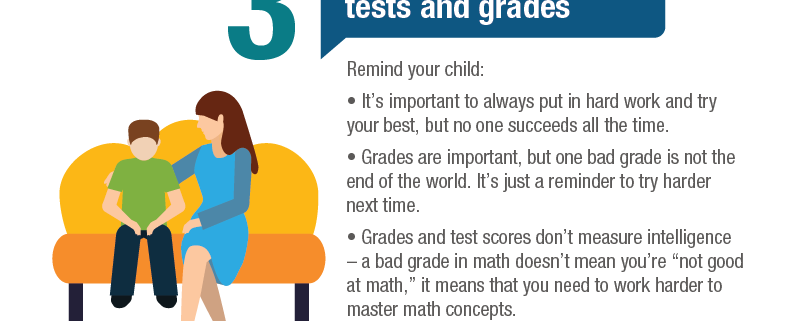Study Skills for Parents
1. Teach your child that he controls his own success
Students often come to believe that doing well in school is about being smart or being lucky. While natural intelligence can give a student an extra edge, school success is about hard work and effort. Each student has control over whether or not he succeeds because each student has control over how much effort he is willing to put in. Here are some tips to help establish this mindset:
- Praise the process rather than the trait. Don’t say, “You’re so smart!” Say, “You worked so hard!” Don’t say, “You’re so good at the violin!” Say, “You practiced so much!”
- Establish a “no excuses” policy. Part of controlling success is taking responsibility for mistakes. It wasn’t mom’s fault that homework was forgotten, and it wasn’t the teacher’s fault that there was a test that wasn’t studied for.
- Emphasize that your role is to help as needed, not to solve everything. You’re there to help explain a tricky math concept, not to finish the entire worksheet.
2. Help establish goals and plans
Long-term success requires more than memorizing math formulae – it requires the ability to set and achieve goals. Take an active role in helping your child establish achievable academic goals, create step-by-step plans for accomplishing those goals, and set rewards for reaching goals. By making this a regular practice, you can help your child become more responsible and goal-oriented.
3. Reduce anxiety about tests and grades
Tests and grades are undeniably important (especially for college-bound high school students), but too many students suffer from anxiety that hinders academic importance. The solution starts with parents who help students put test scores and grades into context. Remind your child:
- It’s important to always put in hard work and try your best, but no one succeeds all the time.
- Grades are important, but one bad grade is not the end of the world. It’s just a reminder to try harder next time.
- Grades and test scores don’t measure intelligence – a bad grade in math doesn’t mean you’re “not good at math,” it means that you need to work harder to master math concepts.
- Test anxiety is real, but it can also be overcome. Students who suffer from testing anxiety should practice relaxation techniques like mindful breathing to help reduce anxiety on test day.
4. Promote a love of learning
The most successful students are those who approach learning with joy rather than with resignation. Here are some ways to help foster a lifelong love of learning:
- Talk about interesting things you’ve learned so that you can demonstrate that learning is a lifelong process.
- Surround your kids with books. Research shows that consistent access to books can increase a child’s motivation to read.
- Encourage your child’s natural interests. Take your budding history buff to a history museum, take a future scientist to a science museum, or get your engineer-minded child models to build.
5. Find extra support as needed
Sometimes extra help is necessary. There are tons of resources to help students overcome studying struggles, from after-school programs at the local library to online courses to individualized support from an organization like C2 Education. If you think your child could benefit from extra support, contact C2 Education for a free consultation!



